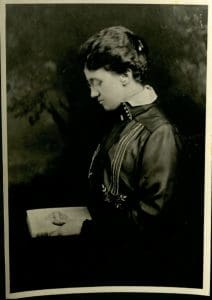In Arthur Elson’s “Woman’s Work in Music,” he names fifteen women who are in one way associated with Boston. These women were either educated here or wrote much of their music while living here. Of the fifteen, the Boston Public Library holds printed music for ten of these women: Amy Cheney Beach (Mrs. H. H. A. Beach), Margaret Ruthven Lang, Ethel Leginska, Mabel Wheeler Daniels, Mrs. Bertha Remick, Clara Kathleen Barnett (nee Rogers), Edna Rosalind Park, Edith Noyes Porter, Mary Knight Wood, and Irene Baumgras (Mrs. Philip Hale; pseudonym, Victor Rene).
Christine Ammer’s “Unsung: A History of Women in American Music” revealed two more female Boston musicians. One of them, Helen Hopekirk, is represented in the library’s collection. While the works of some of these composers are part of the Special Collections department and are therefore unavailable at this time, most of the pieces are part of the library’s research collection and may be used in the library at any time. Some of these women were prominent in their time and are still known today, while others we know little about outside of their music. Here is more information on just a few of these women:
The best known composer of this group was Amy Cheney Beach. She was born in 1867 in New Hampshire. When she was eight years old, her family moved to the Boston area to further her musical education. She made her debut as a pianist in Boston when she was 16, and performed many of her own works around the country. After marrying in 1885 at the age of 18, she gave up performing and concentrated on composing. Her two most ambitious works, the Mass in E Flat and her Gaelic Symphony, were both performed in Boston by the Handel and Haydn Society in 1892 and the Boston Symphony Orchestra in 1896, respectively. Besides those works, she wrote three cantatas, works for piano, violin, and over 60 songs. She was part of the Second New England School along with G. W. Chadwick and Arthur Foote. She died in New York City in 1944.
Margaret Ruthven Lang was born in Boston in 1867 to a musically talented family. Her first works were written when she was 12 years old, but it wasn’t until she was 20 that her music received its first public performance at a vocal recital in Boston. In 1893, she had the privilege of being the first woman composer to have one her works performed by a major symphony orchestra when the Boston Symphony Orchestra debuted her Dramatic Overture op. 12. That same year, her overture Witichis op. 10 was performed at the World’s Columbian Exposition in Chicago. Unfortunately these two works and other orchestral works of her are lost. She was a strong critic of her music and would destroy scores that she had decided were not up to her exacting standards. She did leave behind several choral works, piano solos, over 140 songs, and a few chamber works before she stopped composing in 1919. She lived to be over 100 years old (the Boston Symphony Orchestra performed a concert in her honor in 1967) and died in Boston in 1972.
Clara Kathleen Barnett was born in 1844 in Cheltenham, England. In 1863 she made her debut as an opera singer using the stage name Clara Doria. She performed in opera houses throughout Europe, returning to England in 1866, where she continued to perform concerts. In 1873 she moved to Boston. After she married in 1878, she put aside performing and instead concentrated on composing and teaching. She was appointed as a teacher of singing at the New England Conservatory in 1902, and wrote many books on the topic of singing. She wrote over 100 songs and several instrumental works. She died in Boston in 1931.
Mabel Wheeler Daniels was born in 1878 in Swamscott, Massachusetts. Her father was the president of the Handel and Haydn Society, and both of her parents sang with that ensemble. Her first piece was composed when she was 10 years old. The Desolate City, written for baritone and orchestra, had its first performance at the MacDowell Festival in New Hampshire in 1912, and Peace with a Sword had its first performance in 1917 by the Handel and Haydn Society. She was the head of music at Simmons College from 1913 through 1918, and was awarded honorary degrees from both Tufts and Boston University in the 1930s. She died in 1971.
Ethel Leginska was born in Hull, England, in 1890. She was 17 when she made her first concert tour as a pianist. Besides being an accomplished pianist, she was also known as a conductor. In 1928, she conducted a production of Verdi’s Rigoletto with the National Opera Company at the Boston Opera House. In Boston, she established both the Boston Philharmonic Orchestra (conductor 1926-1927) and headed the Boston Women’s Symphony Orchestra (1926-1930). This ensemble and other ensembles under her baton performed some of Leginska’s own compositions. She died in Los Angeles in 1970.
References:
Woman’s Work in Music, by Elson, Arthur. 1931. MUSIC ML82.E49 1931 [not in catalog]



Add a comment to: Women Composers in Turn of the Century Boston